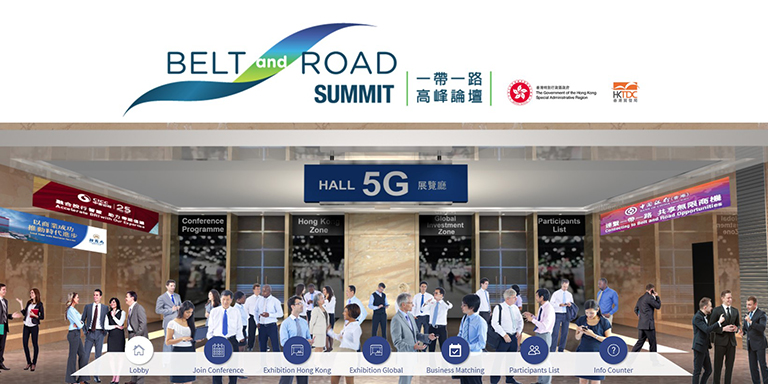The COVID-19 pandemic has turbo-charged the supply chain shake-up which the Sino-United States trade dispute initiated. The change comes as the global logistics sector digitalises rapidly, creating many opportunities for innovation and the reworking of trade routes and economic blocs.
Ways to steer this transformation in a sustainable and inclusive direction were in focus at the fifth Belt and Road Summit, which was held online on 30 November and 1 December.
Organised by the Hong Kong Trade Development Council (HKTDC) and the Hong Kong Special Administrative Region (HKSAR) Government, the event was attended by political, business and society leaders from Mainland China, economies associated with the Belt and Road Initiative and the world at large.
COVID-19 drives sustainable development
At the summit’s Business Plenary session, a panel of business leaders shared valuable insights on sustainable development in the post-pandemic era.
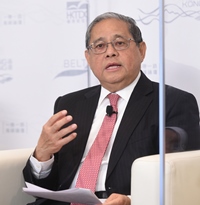
Among the panellists, Victor Fung, Group Chairman of Fung Group, pointed out that, prior to the COVID-19 pandemic, there were two major trends impacting global supply chains: technological change resulting, in particular, from digitalisation; and the Sino-US trade conflict. He noted digitalisation had swept across the world in the past 10 years, affecting trade and every aspect of the global supply chain, from product design to production and distribution.
“The COVID-19 pandemic has accelerated these trends, resulting in a fundamental shift in the world’s supply chains. This creates a huge opportunity in terms of what Hong Kong and the rest of the GBA [Guangdong-Hong Kong-Macao Greater Bay Area], as well as countries along the Belt and Road can do in terms of adapting to this new situation in the global supply chains,” he said.
Impact of COVID-19 on export sector
In response to the COVID-19 pandemic, this year’s summit was changed to an online broadcast. With the new virtual platform helping to overcome geographical boundaries, more than 6,000 participants from about 80 countries and regions attended the event.
Under the theme “A Business Vision for a Sustainable and Inclusive Future”, the two-day summit featured more than 80 government and business leaders from countries and regions along the Belt and Road, along with investors from the mainland, Asia-Pacific region, Europe, the Middle East and Africa, as well as project owners and professional investment advisers.
Geographical connections
Holding the conference virtually presented no barrier to meaningful exchanges within the industry. In addition to various breakout discussion sessions, the 2020 summit featured one-to-one business matching meetings and project pitching sessions that proved popular among both project owners and participants. On offer were 20 investment projects from countries and regions along the Belt and Road, focusing on four major areas – innovation and technology; transport and logistics infrastructure; energy, natural resources and public utilities; and urban development – and covering some 12 countries and regions including Indonesia, Thailand, India, Saudi Arabia, Kenya, Austria, France and the United Kingdom.
The investment projects included the first Hong Kong-themed Thailand-based foreign project in Chonburi (“AMATA – Hong Kong Smart City”), a large-scale integrated project located near Indonesia’s proposed new capital city, a new railway link connecting Eastern Slovakia and Vienna, and other projects related to topical issues such as fighting COVID-19 and green technology. In addition, more than 700 business matching meetings were arranged for project owners, investors and professional service providers, with over 250 companies participating.
ASEAN promotion
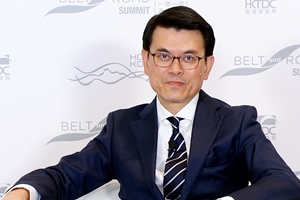
The Association of Southeast Asian Nations (ASEAN) bloc, which plays a crucial role in the Belt and Road Initiative, is a key member of the recently signed Regional Comprehensive Economic Partnership (RCEP) free trade agreement, which was spotlighted at this year’s Policy Dialogue. The session was chaired by Edward Yau, Secretary for Commerce and Economic Development of the HKSAR, and featured Jerry Sambuaga, Vice Minister of Trade of the Republic of Indonesia, as one of the guest speakers. “As the world’s largest trade bloc, the RCEP should create a modern, comprehensive, high-quality and mutually beneficial economic partnership that will expand regular trade and investment while contributing to the global economy,” said Mr Sambuaga.
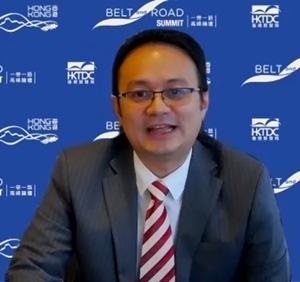
His remark was echoed by Ceferino S Rodolfo, Undersecretary of the Industry Development and Trade Policy Group of the Department of Trade and Industry in the Philippines: “While physical infrastructure is the most tangible aspect of the Belt and Road, equally important are the policies that will facilitate the flow of economic activity among Belt and Road participants and those who are not formally part of [the initiative]. The RCEP is a building block for greater openness in the global economy and is not supposed to be exclusive,” he analysed.
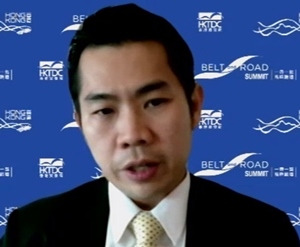
Sompop Pattanariyankool, Assistant Permanent Secretary of the Ministry of Energy in Thailand, highlighted the importance of clean energy. “During the pandemic, we need immediate recovery measures to ensure the energy sector continues to make an effective contribution to overcoming the current situation and empowering the subsequent recovery,” he said.
“To create a healthy, sustainable and inclusive future, it is important to include clean-energy transition as part of this package, focusing on a cleaner, more secure and cost-effective energy system. This may include natural gas, renewables, batteries, hydrogen and other technologies,” he added.
Also speaking at the Policy Dialogue, Sultana Afroz, Secretary to the Government of Bangladesh and CEO of the Public Private Partnership Authority in Bangladesh, shared that the country has set up 79 public-private partnership projects with an investment value of more than US$28 billion to realise the government’s vision of bringing about transformational change to its infrastructure sector.
“Mainland China has always been a prime strategic partner for the Bangladesh government in terms of its development, and most of the major projects in Bangladesh are being constructed by Chinese construction companies,” said Mr Afroz.
Increasing cooperation
One of the thematic breakout sessions - “Fighting the Coronavirus with Innovative Tech and Thriving in a Post-Pandemic World – Opportunities in the Greater Bay Area” – featured Nanshan Zhong, Academician of the China Academy of Engineering, Professor of Respiratory Medicine at Guangzhou Medical University, and Director of China’s National Clinical Research Centre for Respiratory Disease. In his keynote speech, he said there are currently five vaccines going through stage-three clinical trials in the mainland, which also cooperated closely with Indonesia and the Philippines on the development of vaccines. He further emphasised the importance of strengthening the healthcare systems of different countries and regions as the wait for a vaccine continues.
“We still need to enhance cooperation in the medical and health sectors and establish bilateral and multilateral cooperation mechanisms for epidemic response and biosecurity, ensuring that we are equipped with the ability to cope with virus outbreaks through regular detection, early warning, information sharing and the regional coordination and mobilisation of medical resources,” he said. “By doing so, we will be able to prepare for other possible global outbreaks and pandemics through the timely sharing of data and information and by coordinating detection and early warning.
“All countries must join hands to combat COVID-19 internationally. We call for building a community of health for all, and as soon as possible, to deal with potential challenges. Let’s work together to protect health and lives in the region,” he urged.
China International Capital Corporation Ltd served as the Strategic Partner of the fifth Belt and Road Summit. Bank of China (Hong Kong) Ltd was the Regional Banking Partner. China Merchants Group was the Sapphire Sponsor of the summit and China Mobile International Limited was the Platinum Sponsor.
Related links
Belt and Road Summit
Interviews at Belt and Road Summit:
Impact of COVID on the financial sector
Sustainable development
HKTDC Belt and Road Portal
